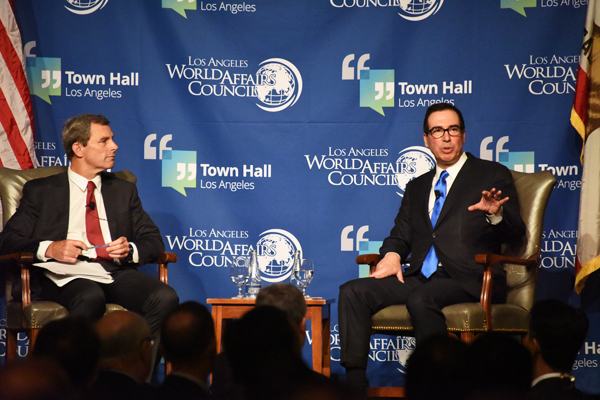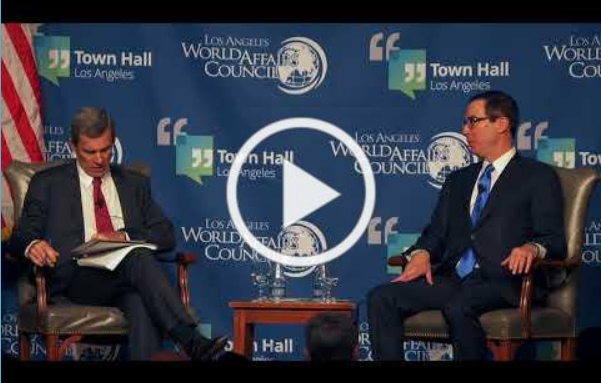
US Treasury Secretary Steven Mnuchin (right).
Treasury Secretary Steven Mnuchin gave an upbeat assessment of the state of the US economy and the anticipated effects of the recent tax bill at a lunch with the LA World Affairs Council on February 26th at the Beverly Wilshire Hotel. He didn’t go into much detail about how the country might pay for the tax cuts, beyond saying that the Trump administration has no plans to cut social welfare entitlements. He said he was in favor of a strong dollar in the long term, higher wages for workers and added that “a little bit of inflation” is a good thing.
“We had one of the highest corporate tax rates in the world,” Mnuchin said, “It was encouraging companies to leave hundreds of billions of dollars offshore.” Now, US companies will have an incentive to bring back money to the US, while for consumers, he said, under the new tax code “80% of Americans will see changes and get back money.” When asked if there would be a “do-over” of the Tax Cuts and Jobs Act to fix some issues that were unsatisfactory in the original bill, Mnuchin said that there were some 80 different issues in the tax bill that the Treasury was looking at to clarify or amend, which is an ongoing process.
Mnuchin rejected any suggestion that the current administration was scaring the markets by showing a lack of fiscal discipline. “I would debate that. I don’t think markets are concerned… if anything I would say the markets are very favorable to these policies.” He acknowledged there was a “10% correction” in the markets in early February, but said that the markets still worked smoothly, some of the losses have already been recouped and “if anything, I would say the markets are very favorable to these policies.”
When pushed on the rising levels of government debt, Mnuchin said that much of the debt was inherited from previous administrations, and he confidently predicted that over a ten year period the gains in GDP that would be enhanced by the tax cuts would reduce US debt substantially. “When I got this job people said that the US is stuck at 2% GDP growth - we want to have policies to get us to 3% - we are focused on policies that lead to sustained growth.”
Now that the tax bill has been passed, Mnuchin said they would be looking at trade. “The president absolutely believes in free trade… we just want to make sure we have reciprocal trade.” He also said he was confident they could bring down the trade deficit the US has with China: “President Trump and President Xi have one of the greatest relationships. We are having lots of dialogue. And since the first meeting at Mar-a-Lago President Trump made it clear that the trade deficit has to come down.” When it was pointed out the deficit is going up, he said, “We are only one year in.”
When asked if he was comfortable with the level of the dollar, Mnuchin said “Nice try,” eliciting some laughter, before saying “I don’t comment on where the dollar is in the short term.” He said that the administration is not setting policy to impact the dollar. “If anything, interest rates have a bigger impact than anything else,” he said. “I fundamentally believe in the long term a strong dollar is good for the US.” On interest rates, he said that having traveled the country during the presidential campaign it became clear to him that “the reason President Trump won is that the average worker had had no wage increases. A lot of our tax plan is designed to create wage increases for workers. We want some wage inflation.”
On the question of Bitcoin and other cryptocurrencies, and specifically their use by terrorist organizations to finance their operations, Mnuchin said the responsible agency is the Financial Stability Oversight Council, (established under President Obama as part of the Dodd-Frank Act in response to the 2007-08 financial crisis). “I don’t have the right to tell them what to do, but I do have the right to convene them, and we have set up a sub-committee to look at cryptocurrency.” He said Bitcoin had jumped from $500 to $20,000, then plunged back to $6,000 and now trades around $10,000: “This is obviously one of the most volatile investments you’ve ever seen – I don’t even know if you can call it a currency.” Within the US, Bitcoin traders are subject to the same regulations as any other investors, including provisions on money laundering etc. “Our concern is that there are other parts of the world where you cannot monitor anyone – it is the equivalent of the old numbered Swiss bank account. We are working on this with the other members of the G 20.”
On Iranian sanctions, Mnuchin said “I will be very careful on commenting on where they are going.” In general, he said, there are some flaws in the JCPOA (Joint Comprehensive Plan of Action – the Iran sanctions deal), notably in that it allowed Iran to continue ballistic missile development. “The President wants a better deal, we’ve continued to sanction them and will continue to do so.”
When asked from the audience how secure he felt in his job now the Trump administration was – according to the questioner – “imploding”, Mnuchin responded, “I guess you didn’t vote for the President” which also met with some laughter. He went on to defend what he said the administration had accomplished in its first year – tax cuts, deregulation – and added “I consider it to be a great honor to be in this job.”
As for the sanctions on North Korea, Mnuchin said “We have the authority to say that anyone who trades with North Korea, we have the ability to block them from trading with us.” He said the sanctions are drawn up in close cooperation with the intelligence agencies and have to go through a legal process to make sure they can be enforced. “There are checks and balances, but I can assure you that as long as North Korea is doing these things, we will put more sanctions on them.”

 Watch the full interview with Treasury Secretary Mnuchin
Watch the full interview with Treasury Secretary Mnuchin